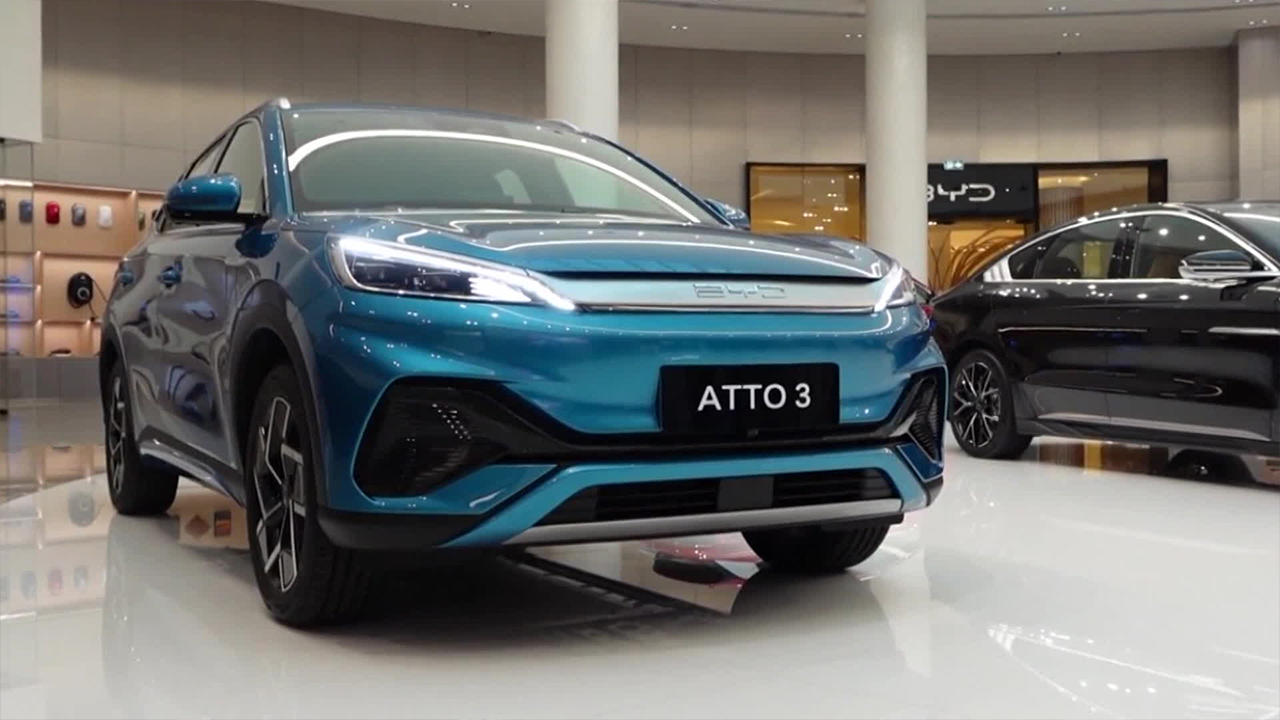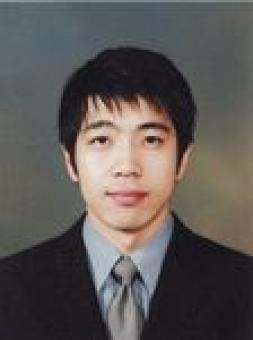[Anchor]
Tesla, led by Elon Musk, is synonymous with electric vehicles.
However, there is a Chinese electric vehicle company that is challenging Tesla's status.
That company is BYD.
Based on a strong domestic market in China, it has long been the world's number one in production volume.
Now, its sales figures can no longer be ignored.
Last year, its sales reached over 1.76 million units, closely trailing Tesla, and in the fourth quarter, it even sold 100,000 more units than Tesla, changing the landscape of the electric vehicle market.
Self-defined as "China's champion, the world's champion," BYD has today (1.16) thrown down the gauntlet to our electric vehicle market with its price competitiveness.
Reporter Jung Jae-woo has the story.
[Report]
The first passenger electric vehicle that BYD has introduced to the Korean market is the 'Atto 3.'
This small SUV can travel 321 km on a single charge and has sold over 1 million units in the global market since its launch in 2022.
They have presented a proven representative vehicle.
[Jo In-cheol/BYD Korea Passenger Vehicle Division Head: "I believe that experiencing and trying BYD will help consumers understand our technology well. If it takes time, I think Korean consumers will recognize BYD's technological capabilities..."]
The price was lower than expected.
In the 31 million won range.
This is about 10 million won cheaper than Hyundai Motor Group's Kona, which occupies 70% of the domestic electric vehicle market.
With subsidies, the price could drop to the 20 million won range, but government subsidies have not yet been confirmed.
Dealerships that deal directly with customers.
The immediate impact is expected to be minimal.
[Hwang Man-ik/Hyundai Motor KINTEX Branch Sales Manager: "I don't think those who purchased due to the price will hold onto it in the long term. Once they use it, there will be various inconveniences..."]
BYD plans to approach domestic consumers by targeting niche markets such as rental cars, and will subsequently launch mid-sized electric sedans in the second half of the year.
However, overcoming concerns about battery safety and the image of Chinese brands among domestic consumers is a significant challenge.
[Kwon Yong-joo/Professor of Automotive Transportation Design at Kookmin University: "There is only one model available. So while BYD's entry into the domestic market has a symbolic role, it will take some time for consumers to open their wallets."]
The industry is closely watching how the entry of the world's number one Chinese electric vehicle brand will change the dynamics of the domestic market.
This is KBS News, Jung Jae-woo.
Tesla, led by Elon Musk, is synonymous with electric vehicles.
However, there is a Chinese electric vehicle company that is challenging Tesla's status.
That company is BYD.
Based on a strong domestic market in China, it has long been the world's number one in production volume.
Now, its sales figures can no longer be ignored.
Last year, its sales reached over 1.76 million units, closely trailing Tesla, and in the fourth quarter, it even sold 100,000 more units than Tesla, changing the landscape of the electric vehicle market.
Self-defined as "China's champion, the world's champion," BYD has today (1.16) thrown down the gauntlet to our electric vehicle market with its price competitiveness.
Reporter Jung Jae-woo has the story.
[Report]
The first passenger electric vehicle that BYD has introduced to the Korean market is the 'Atto 3.'
This small SUV can travel 321 km on a single charge and has sold over 1 million units in the global market since its launch in 2022.
They have presented a proven representative vehicle.
[Jo In-cheol/BYD Korea Passenger Vehicle Division Head: "I believe that experiencing and trying BYD will help consumers understand our technology well. If it takes time, I think Korean consumers will recognize BYD's technological capabilities..."]
The price was lower than expected.
In the 31 million won range.
This is about 10 million won cheaper than Hyundai Motor Group's Kona, which occupies 70% of the domestic electric vehicle market.
With subsidies, the price could drop to the 20 million won range, but government subsidies have not yet been confirmed.
Dealerships that deal directly with customers.
The immediate impact is expected to be minimal.
[Hwang Man-ik/Hyundai Motor KINTEX Branch Sales Manager: "I don't think those who purchased due to the price will hold onto it in the long term. Once they use it, there will be various inconveniences..."]
BYD plans to approach domestic consumers by targeting niche markets such as rental cars, and will subsequently launch mid-sized electric sedans in the second half of the year.
However, overcoming concerns about battery safety and the image of Chinese brands among domestic consumers is a significant challenge.
[Kwon Yong-joo/Professor of Automotive Transportation Design at Kookmin University: "There is only one model available. So while BYD's entry into the domestic market has a symbolic role, it will take some time for consumers to open their wallets."]
The industry is closely watching how the entry of the world's number one Chinese electric vehicle brand will change the dynamics of the domestic market.
This is KBS News, Jung Jae-woo.
■ 제보하기
▷ 카카오톡 : 'KBS제보' 검색, 채널 추가
▷ 전화 : 02-781-1234, 4444
▷ 이메일 : kbs1234@kbs.co.kr
▷ 유튜브, 네이버, 카카오에서도 KBS뉴스를 구독해주세요!
- BYD challenges Korean market
-
- 입력 2025-01-17 00:29:02

[Anchor]
Tesla, led by Elon Musk, is synonymous with electric vehicles.
However, there is a Chinese electric vehicle company that is challenging Tesla's status.
That company is BYD.
Based on a strong domestic market in China, it has long been the world's number one in production volume.
Now, its sales figures can no longer be ignored.
Last year, its sales reached over 1.76 million units, closely trailing Tesla, and in the fourth quarter, it even sold 100,000 more units than Tesla, changing the landscape of the electric vehicle market.
Self-defined as "China's champion, the world's champion," BYD has today (1.16) thrown down the gauntlet to our electric vehicle market with its price competitiveness.
Reporter Jung Jae-woo has the story.
[Report]
The first passenger electric vehicle that BYD has introduced to the Korean market is the 'Atto 3.'
This small SUV can travel 321 km on a single charge and has sold over 1 million units in the global market since its launch in 2022.
They have presented a proven representative vehicle.
[Jo In-cheol/BYD Korea Passenger Vehicle Division Head: "I believe that experiencing and trying BYD will help consumers understand our technology well. If it takes time, I think Korean consumers will recognize BYD's technological capabilities..."]
The price was lower than expected.
In the 31 million won range.
This is about 10 million won cheaper than Hyundai Motor Group's Kona, which occupies 70% of the domestic electric vehicle market.
With subsidies, the price could drop to the 20 million won range, but government subsidies have not yet been confirmed.
Dealerships that deal directly with customers.
The immediate impact is expected to be minimal.
[Hwang Man-ik/Hyundai Motor KINTEX Branch Sales Manager: "I don't think those who purchased due to the price will hold onto it in the long term. Once they use it, there will be various inconveniences..."]
BYD plans to approach domestic consumers by targeting niche markets such as rental cars, and will subsequently launch mid-sized electric sedans in the second half of the year.
However, overcoming concerns about battery safety and the image of Chinese brands among domestic consumers is a significant challenge.
[Kwon Yong-joo/Professor of Automotive Transportation Design at Kookmin University: "There is only one model available. So while BYD's entry into the domestic market has a symbolic role, it will take some time for consumers to open their wallets."]
The industry is closely watching how the entry of the world's number one Chinese electric vehicle brand will change the dynamics of the domestic market.
This is KBS News, Jung Jae-woo.
Tesla, led by Elon Musk, is synonymous with electric vehicles.
However, there is a Chinese electric vehicle company that is challenging Tesla's status.
That company is BYD.
Based on a strong domestic market in China, it has long been the world's number one in production volume.
Now, its sales figures can no longer be ignored.
Last year, its sales reached over 1.76 million units, closely trailing Tesla, and in the fourth quarter, it even sold 100,000 more units than Tesla, changing the landscape of the electric vehicle market.
Self-defined as "China's champion, the world's champion," BYD has today (1.16) thrown down the gauntlet to our electric vehicle market with its price competitiveness.
Reporter Jung Jae-woo has the story.
[Report]
The first passenger electric vehicle that BYD has introduced to the Korean market is the 'Atto 3.'
This small SUV can travel 321 km on a single charge and has sold over 1 million units in the global market since its launch in 2022.
They have presented a proven representative vehicle.
[Jo In-cheol/BYD Korea Passenger Vehicle Division Head: "I believe that experiencing and trying BYD will help consumers understand our technology well. If it takes time, I think Korean consumers will recognize BYD's technological capabilities..."]
The price was lower than expected.
In the 31 million won range.
This is about 10 million won cheaper than Hyundai Motor Group's Kona, which occupies 70% of the domestic electric vehicle market.
With subsidies, the price could drop to the 20 million won range, but government subsidies have not yet been confirmed.
Dealerships that deal directly with customers.
The immediate impact is expected to be minimal.
[Hwang Man-ik/Hyundai Motor KINTEX Branch Sales Manager: "I don't think those who purchased due to the price will hold onto it in the long term. Once they use it, there will be various inconveniences..."]
BYD plans to approach domestic consumers by targeting niche markets such as rental cars, and will subsequently launch mid-sized electric sedans in the second half of the year.
However, overcoming concerns about battery safety and the image of Chinese brands among domestic consumers is a significant challenge.
[Kwon Yong-joo/Professor of Automotive Transportation Design at Kookmin University: "There is only one model available. So while BYD's entry into the domestic market has a symbolic role, it will take some time for consumers to open their wallets."]
The industry is closely watching how the entry of the world's number one Chinese electric vehicle brand will change the dynamics of the domestic market.
This is KBS News, Jung Jae-woo.
-
-

정재우 기자 jjw@kbs.co.kr
정재우 기자의 기사 모음
-
이 기사가 좋으셨다면
-
좋아요
0
-
응원해요
0
-
후속 원해요
0















이 기사에 대한 의견을 남겨주세요.